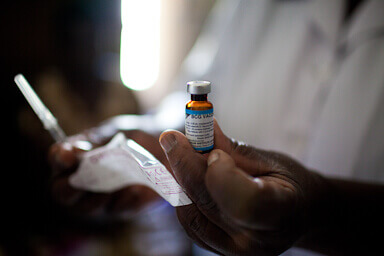Kari StoeverAeras
Kari Stoever is Vice President of External Affairs at Aeras, a non-profit biotech advancing the development of tuberculosis vaccines for the world.
In this guest post, Kari Stoever—vice president of External Affairs at Aeras—writes about European support for new vaccines against tuberculosis (TB).
TB is a disease most often associated with countries in the developing world, particularly in Asia and Africa. While India and China had the largest number of cases in 2012, Europe is not immune. Europe accounts for almost 18 percent of global cases of multidrug-resistant and extensively drug-resistant TB, with the highest burden in Eastern Europe. TB is estimated to cost the European Union around €6 billion (US$8 billion) each year. New vaccines to prevent TB will be the most cost-effective and long-term approach to saving lives and money, so it makes sense that Europe leads the world in the research and development (R&D) of TB vaccines.
Europe is a major contributor to the development of vaccines globally, with as much as 75 percent of the global TB vaccine portfolio either originating in Europe or being developed in partnership with European public or private organizations. Of the five major donors contributing to TB vaccine R&D, three of them are European.
Since 2000, the European Commission (EC) has invested more than €34 million (over US$46 million) in research for new TB vaccines. Along with European Union Member States, the EC has also invested more than €42 million towards clinical trial site preparedness, capacity building, and support in Africa through the European and Developing Countries Clinical Trials Partnership (EDCTP). Recently the EC announced a €25 million (approximately US$34 million) call for proposals to accelerate the development of new TB vaccines.

The announcement comes as an important new collaboration between European funders and a global network of researchers is forming. The new initiative, the Global TB Vaccine Partnership (GTBVP), aims to channel finances to TB vaccine R&D to establish a robust and diversified global portfolio of clinical and preclinical candidates. One of the top priorities for the GTBVP will be to strengthen and diversify the preclinical and clinical portfolio to facilitate a more rational, cost-effective, and accelerated vaccine development process through the sharing of technical, financial, and market risks. The GTBVP’s role will be to foster greater alignment among researchers and funders’ objectives, and implement an effective mechanism for collaboration, information-sharing, and decision-making.
Aeras, the Netherlands-based TuBerculosis Vaccine Initiative (TBVI), the EC, the European Investment Bank (EIB), the Bill & Melinda Gates Foundation, and the EDCTP are spearheading the development of the GTBVP.
The evolution of the collaboration
The push for a new financing mechanism and governance structure began in March 2012 when the EC, with support of the EIB, expanded its engagement with TBVI and Aeras to develop a Business Case for Investment. The document provides evidence of a viable market incentive for new TB vaccines, opening the door for more expensive later stage trials to be financed through cost-sharing arrangements with industry and the use of other risk-sharing financial instruments. Public sector grant funding for early stage research would act as a catalyst for this private sector investment, providing significant leverage to donors.
By working with researchers around the world, it is envisioned that the GTBVP will play a crucial role in ensuring that research into life-saving TB vaccines continues to progress in the most efficient way possible. Europe’s leadership has been critical to the formation of the partnership, and the EC is to be commended for its excellent commitment to much-needed health interventions, especially a vaccine that would drastically reduce the number of TB cases. TB is a global threat requiring global action, and through the new partnership there is a historic opportunity for donors, disease-endemic countries, researchers, and other stakeholders to work together and achieve the goal of having new, more effective TB vaccines available globally.